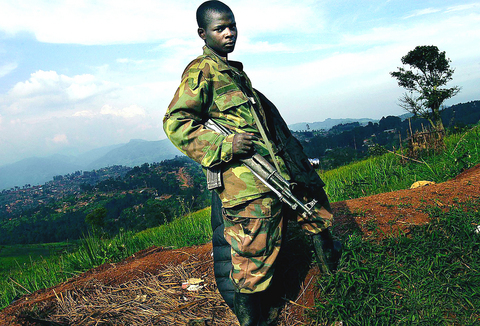Rwanda will no longer threaten to send soldiers into the neighboring Democratic Republic of Congo to pursue Rwandan Hutu rebels, having received assurances from the international community, Rwandan Foreign Minister Charles Murigande said yesterday.
"We are no longer going to threaten to go into the DR Congo," he said speaking by telephone from Nairobi.

PHOTO: AFP
However the government in Kinshasa, capital of the DR Congo, once again charged that Rwanda already had troops on its territo-ry, and called for them to be withdrawn.
Rwanda "should start by pulling its troops out," government spokes-man Henri Mova said yesterday.
In his statement, the Rwandan minister said: "The international community has given us the assurance that it will tackle the problem of the ex-FAR and the Intera-hamwe," a reference to groups of mainly Hutu Rwandan rebels that took part in the genocidal massacres of 1994 in Rwanda.
Fighting between rival army factions ended days of relative calm in eastern Congo on Sunday.
Soldiers loyal to the Congolese government fought dissident units around the deserted Congolese farming town of Kanyabayonga.
Iliane Nabaa, a UN spokeswoman in the capital Kinshasa, said the clashes started at around 6am.
There were also credible reports of fighting between rebel fighters and the pro-Kinshasa Mai Mai militia around Nyabiondo, some 50km to the southwest, UN spokeswoman Jacqueline Chenard said.
Congo's fragile transitional government and its fractious army is struggling to impose order in the border region with Rwanda, where the UN says at least 100,000 people have been displaced by recent clashes between rival army factions.
Fighting erupted over a week ago between reinforcements the government sent to the east and RCD-Goma, a faction backed by Rwanda during Congo's five-year war but now meant to be part of the national army.
Rwanda has long expressed frustration at Kinshasa's failure to disarm Hutu militias who form the nucleus of rebel groups who have staged attacks on Rwanda from their jungle bases.
Kinshasa has accused Rwanda of already sending in troops to support Congolese rebels and treated Rwanda's latest announcement with scepticism.
"We don't have that much confidence in this declaration. Rwanda has to first of all withdraw its troops from Congo before withdrawing the threat," said Information Minister Henri Mova Sakanyi.
A government delegation held meetings on Sunday with local leaders in the eastern province of North Kivu, where a new regional army commander, General Gabriel Amisi, has been appointed to help clamp down on rebels.
But the arrival of additional government troops in the region has unsettled its Rwandan-speaking community, who fear they will be attacked out of anti-Rwandan prejudice.
North Kivu's Rwandaphone community leader, Felicien Hitimana, accused government troops of arbitrary arrest, torture and murder of Rwandan-speaking Congolese in the province, which is rich in gold, minerals and coltan.
At least 100,000 civilians have yet to return home after fleeing the fighting, Patrick Lavand-'Homme, the head of the UN's Office for the Coordination of Humanitarian Affairs in North Kivu, said.

Tens of thousands of Filipino Catholics yesterday twirled white cloths and chanted “Viva, viva,” as a centuries-old statue of Jesus Christ was paraded through the streets of Manila in the nation’s biggest annual religious event. The day-long procession began before dawn, with barefoot volunteers pulling the heavy carriage through narrow streets where the devout waited in hopes of touching the icon, believed to hold miraculous powers. Thousands of police were deployed to manage crowds that officials believe could number in the millions by the time the statue reaches its home in central Manila’s Quiapo church around midnight. More than 800 people had sought

DENIAL: Pyongyang said a South Korean drone filmed unspecified areas in a North Korean border town, but Seoul said it did not operate drones on the dates it cited North Korea’s military accused South Korea of flying drones across the border between the nations this week, yesterday warning that the South would face consequences for its “unpardonable hysteria.” Seoul quickly denied the accusation, but the development is likely to further dim prospects for its efforts to restore ties with Pyongyang. North Korean forces used special electronic warfare assets on Sunday to bring down a South Korean drone flying over North Korea’s border town. The drone was equipped with two cameras that filmed unspecified areas, the General Staff of the North Korean People’s Army said in a statement. South Korea infiltrated another drone

COMMUNIST ALIGNMENT: To Lam wants to combine party chief and state presidency roles, with the decision resting on the election of 200 new party delegates next week Communist Party of Vietnam General Secretary To Lam is seeking to combine his party role with the state presidency, officials said, in a move that would align Vietnam’s political structure more closely to China’s, where President Xi Jinping (習近平) heads the party and state. Next week about 1,600 delegates are to gather in Hanoi to commence a week-long communist party congress, held every five years to select new leaders and set policy goals for the single-party state. Lam, 68, bade for both top positions at a party meeting last month, seeking initial party approval ahead of the congress, three people briefed by

Cambodia’s government on Wednesday said that it had arrested and extradited to China a tycoon who has been accused of running a huge online scam operation. The Cambodian Ministry of the Interior said that Prince Holding Group chairman Chen Zhi (陳志) and two other Chinese citizens were arrested and extradited on Tuesday at the request of Chinese authorities. Chen formerly had dual nationality, but his Cambodian citizenship was revoked last month, the ministry said. US prosecutors in October last year brought conspiracy charges against Chen, alleging that he had been the mastermind behind a multinational cyberfraud network, used his other businesses to launder